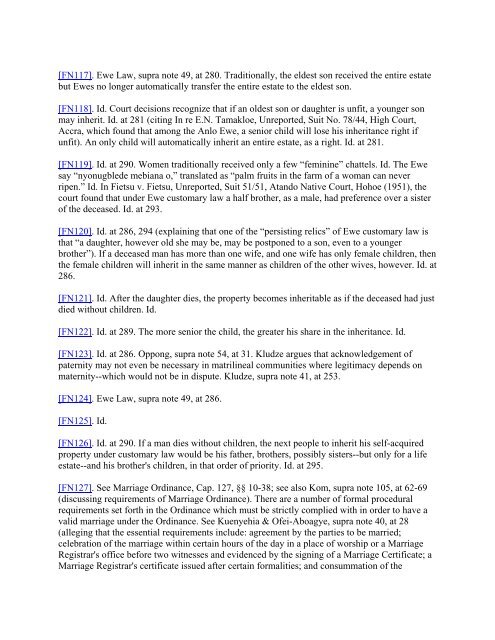Law, Culture and Women's Inheritance Rights in ... - Leitner Center
Law, Culture and Women's Inheritance Rights in ... - Leitner Center
Law, Culture and Women's Inheritance Rights in ... - Leitner Center
Create successful ePaper yourself
Turn your PDF publications into a flip-book with our unique Google optimized e-Paper software.
[FN117]. Ewe <strong>Law</strong>, supra note 49, at 280. Traditionally, the eldest son received the entire estate<br />
but Ewes no longer automatically transfer the entire estate to the eldest son.<br />
[FN118]. Id. Court decisions recognize that if an oldest son or daughter is unfit, a younger son<br />
may <strong>in</strong>herit. Id. at 281 (cit<strong>in</strong>g In re E.N. Tamakloe, Unreported, Suit No. 78/44, High Court,<br />
Accra, which found that among the Anlo Ewe, a senior child will lose his <strong>in</strong>heritance right if<br />
unfit). An only child will automatically <strong>in</strong>herit an entire estate, as a right. Id. at 281.<br />
[FN119]. Id. at 290. Women traditionally received only a few “fem<strong>in</strong><strong>in</strong>e” chattels. Id. The Ewe<br />
say “nyonugblede mebiana o,” translated as “palm fruits <strong>in</strong> the farm of a woman can never<br />
ripen.” Id. In Fietsu v. Fietsu, Unreported, Suit 51/51, At<strong>and</strong>o Native Court, Hohoe (1951), the<br />
court found that under Ewe customary law a half brother, as a male, had preference over a sister<br />
of the deceased. Id. at 293.<br />
[FN120]. Id. at 286, 294 (expla<strong>in</strong><strong>in</strong>g that one of the “persist<strong>in</strong>g relics” of Ewe customary law is<br />
that “a daughter, however old she may be, may be postponed to a son, even to a younger<br />
brother”). If a deceased man has more than one wife, <strong>and</strong> one wife has only female children, then<br />
the female children will <strong>in</strong>herit <strong>in</strong> the same manner as children of the other wives, however. Id. at<br />
286.<br />
[FN121]. Id. After the daughter dies, the property becomes <strong>in</strong>heritable as if the deceased had just<br />
died without children. Id.<br />
[FN122]. Id. at 289. The more senior the child, the greater his share <strong>in</strong> the <strong>in</strong>heritance. Id.<br />
[FN123]. Id. at 286. Oppong, supra note 54, at 31. Kludze argues that acknowledgement of<br />
paternity may not even be necessary <strong>in</strong> matril<strong>in</strong>eal communities where legitimacy depends on<br />
maternity--which would not be <strong>in</strong> dispute. Kludze, supra note 41, at 253.<br />
[FN124]. Ewe <strong>Law</strong>, supra note 49, at 286.<br />
[FN125]. Id.<br />
[FN126]. Id. at 290. If a man dies without children, the next people to <strong>in</strong>herit his self-acquired<br />
property under customary law would be his father, brothers, possibly sisters--but only for a life<br />
estate--<strong>and</strong> his brother's children, <strong>in</strong> that order of priority. Id. at 295.<br />
[FN127]. See Marriage Ord<strong>in</strong>ance, Cap. 127, §§ 10-38; see also Kom, supra note 105, at 62-69<br />
(discuss<strong>in</strong>g requirements of Marriage Ord<strong>in</strong>ance). There are a number of formal procedural<br />
requirements set forth <strong>in</strong> the Ord<strong>in</strong>ance which must be strictly complied with <strong>in</strong> order to have a<br />
valid marriage under the Ord<strong>in</strong>ance. See Kuenyehia & Ofei-Aboagye, supra note 40, at 28<br />
(alleg<strong>in</strong>g that the essential requirements <strong>in</strong>clude: agreement by the parties to be married;<br />
celebration of the marriage with<strong>in</strong> certa<strong>in</strong> hours of the day <strong>in</strong> a place of worship or a Marriage<br />
Registrar's office before two witnesses <strong>and</strong> evidenced by the sign<strong>in</strong>g of a Marriage Certificate; a<br />
Marriage Registrar's certificate issued after certa<strong>in</strong> formalities; <strong>and</strong> consummation of the


